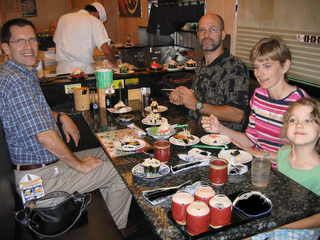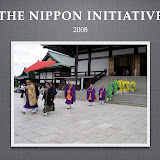8:26 a.m.
We just boarded the train from Miyakonojo to Hiroshima with a few stops in between. Miyakonojo is a city about the size of Fishers; however, there is much more of a “downtown” area complete with more than few multiple-storied buildings. The pace of life here is much, much slower than in Tokyo. We understand this is true for most of Kyushu, which is the island where Miyakonojo is located. The name of the big island, where Tokyo is located, is called Honshu. By the way, Miyakonojo is situated in a valley with some beautiful mountains to its west.
We stayed overnight for two nights with Tom and Paula Carr and their four children, who range in age from 11 to 5. Andrew is the oldest. Next is Lindy, a girl, age 9; then, Mitchell, age 7. Finally, Tevia, also a girl, is the youngest. We thoroughly enjoyed fellowshipping with the Carrs, who serve with ABWE. Elliott especially enjoyed hanging out with Andrew. Elliott went to school with Andrew and then on to watch his swimming lessons later in the afternoon.
 Last evening for dinner, the Carrs took us to a sushi bar. We were seated in a booth arranged along with others around a sort of island where a chef prepared a wide variety of individual servings of sushi on small plates. The chef set the plates on a moving track that snaked its way around the restaurant past all of the booths. Customers select which sushi they want to consume and remove them from the track. The prices of the various types are determined by which type of plate the chef sets them on. There were five or six types of plates in all with prices ranging from 100 yen to 550 yen. When customers are finished, a waitress comes by, “adds” up the plates, and calculates your bill. With the Carrs, there were nine of us altogether. Our total bill was under $40.
Last evening for dinner, the Carrs took us to a sushi bar. We were seated in a booth arranged along with others around a sort of island where a chef prepared a wide variety of individual servings of sushi on small plates. The chef set the plates on a moving track that snaked its way around the restaurant past all of the booths. Customers select which sushi they want to consume and remove them from the track. The prices of the various types are determined by which type of plate the chef sets them on. There were five or six types of plates in all with prices ranging from 100 yen to 550 yen. When customers are finished, a waitress comes by, “adds” up the plates, and calculates your bill. With the Carrs, there were nine of us altogether. Our total bill was under $40.There are a few others who are serving with the Carrs in Miyakonojo. Yesterday morning, while Dale spent time with Paula, I met for breakfast with Tom and another missionary, Chris Sadowitz. I first met both the Carrs and the Sadowitz’ back in the early ‘90s when I served on the ABWE advisory board prior to our coming to Hamilton Hills. Tom and Chris provided some good insight and helpful suggestions for the project we are considering.
Several years ago an anonymous donor gave a large sum of money to the missionaries here to be used for purchasing property and constructing/renovating buildings useful for ministry. One of the ministries Chris and Tom would like to get going is a coffee shop, to which they could invite Japanese for coffee and light refreshments and where they could interact about spiritual things or come for more informal English lessons. Chris and Tom took me to the property and showed me the coffee shop, which has already been set up. The only thing missing is a couple or individual who would be willing to take it on as their ministry.
The coffee shop is also a perfect setting also for what we are intending to do. One concern that Tom has is what he referred to as “reproducibility”. What he meant by that term is his intention of making sure that whatever ministry is begun is something that Japanese nationals can carry on in the future. This doesn’t mean that he and Chris are closed to the idea of an English-teaching/relationship-building ministry utilizing college students. To the contrary, they are very excited about what we are proposing. It simply means that we and they also need to pray for more workers to serve vocationally and for more Japanese to take on ministries that they can do. For example, a Japanese person can run the coffee shop. They would not use it for English lessons, but they could use it as a meeting place where relationships are built for evangelism, and for Christian fellowship, Bible study, and interaction about spiritual things.
In the afternoon, Dale and I, along with the Carrs, met with two young Japanese ladies who are involved in their ministries. Izumi, age 29, has spent some time in the States as a student with Word of Life. The other lady, Chika, is married to a Russian man, who was born and raised in an area of Korea very near Russia. In fact, Chika speaks Japanese and English. Her husband speaks Korean, Russian, and some English. He is learning Japanese, but in the meantime, as a couple, they have a few challenges when it comes to communicating with each other.
Both ladies told us that from their perspective they thought what we are proposing would be great. We asked them to share whatever insights or advice they might have. They told us that English instruction would be especially attractive to high school students if we could promote it as helping them to advance in their education. They suggested that we focus on helping students with phonics, grammar, and correct pronunciation. This was very helpful advice and gave us several ideas for the content of lessons we might prepare for going forward.
Based on what we learned here, it seems that there are at least two tracks for what we could have students do here with English instruction. First, there is a need simply for practicing conversational English. By the way, yesterday morning at the coffee shop, Dale and I sat in on such a lesson with a Japanese woman named Kyiyoko. Second, there is a need, as Izumi and Chika shared, for helping people, especially students, with phonics, grammar, and correct pronunciation. Naturally all of this is for the purpose of building relationships in order to share more the Gospel more effectively.

No comments:
Post a Comment